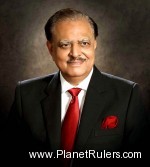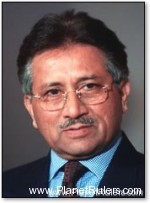Arif Alvi, President of Pakistan (since Sept 9, 2018)
 Arif-ur-Rehman Alvi (born 29 August 1949) is a Pakistani politician who is the 13th and current President of Pakistan, in office since 9 September 2018.
Arif-ur-Rehman Alvi (born 29 August 1949) is a Pakistani politician who is the 13th and current President of Pakistan, in office since 9 September 2018.
He was a member of the National Assembly of Pakistan from June 2013 to May 2018 and again from August to September 2018. A founding member of Pakistan Tehreek-i-Insaf (PTI), Alvi was elected as President of Pakistan on 4 September 2018 following the presidential election.
His father, Habib-ur-Rehman Elahi Alvi, was a dentist in India who migrated to Karachi after the establishment of Pakistan, and opened a dental clinic in the Saddar Town. His father became politically affiliated with Jamaat-e-Islami Pakistan. According to the website of Pakistan Tehreek-e-Insaf, Alvi’s father was a dentist of Jawaharlal Nehru.
After completing his early education in Karachi, he moved to Lahore in 1967 for education. He received a Bachelor of Dental Surgery degree from De’Montmorency College of Dentistry. He completed his Master’s degree in prosthodontics from the University of Michigan in 1975.He received a Masters degree in orthodontics in 1984 from the University of the Pacific in San Francisco, California. After returning to Pakistan, he started practicing dentistry and setup Alvi Dental Hospital.
Alvi is married to Samina Alvi. The couple has four married children.
Source: https://en.wikipedia.org/wiki/Arif_Alvi
Mamnoon Hussain, Former President of Pakistan (since Sept 9, 2014)
 Mamnoon Hussain hails from an Urdu-speaking family of shoe traders and was born in Agra, British India. He and his family migrated to Karachi in 1949 after the Partition of India in 1947. He earned his degree from the Institute of Business Administration (IBA) in Karachi in the 1960s. Hussain was once president of the Karachi Chamber of Commerce and Industry. He briefly served as Governor of Sindh in 1999.
Mamnoon Hussain hails from an Urdu-speaking family of shoe traders and was born in Agra, British India. He and his family migrated to Karachi in 1949 after the Partition of India in 1947. He earned his degree from the Institute of Business Administration (IBA) in Karachi in the 1960s. Hussain was once president of the Karachi Chamber of Commerce and Industry. He briefly served as Governor of Sindh in 1999.
Azhar Haroon, current president of the Karachi Chamber of Commerce and Industry is quoted to have said: “He had no political affiliation until 1999 but his polite discourse and professional ability impressed Nawaz Sharif, who made him governor of Sindh” He is a relatively less known figure, a Nawaz Sharif loyalist, and was elected as President of Pakistan as the official nominee of the PML-N in the July 2013 presidential election. Hussain secured 432 votes and his only rival Wajihuddin Ahmed received 77. He took oath on 9 September 2013 in a prestigious ceremony held at Aiwan-i-Sadar, attended by main stream political and military leadership alongside foreign dignitaries, media personnel and his close relatives.
Source: http://en.wikipedia.org/wiki/Mamnoon_Hussain
Asif Ali Zardari, Former President of Islamic Republic of Pakistan
Co-Chairman Senator Asif Ali Zardari was born on July 26, 1955 in a prominent Baloch family from Sindh. He is the son of veteran politician Mr. Hakim Ali Zardari. On his maternal side he is the great-grandson of Khan Bahadur Hassan Ali Effendi, the founder of the first educational institution for Muslims in Sindh. The founder of Pakistan, Quaid-e-Azam Muhammad Ali Jinnah was among the prominent students to graduate from the Sindh Madrasa. Mr Zardari received his primary education at the Karachi Grammar School and his secondary education at Cadet College Petaro. He pursued his further education in London where he studied Business.
He was married to Shaheed Mohtarma Benazir Bhutto in 1987 and was widowed on December 27, 2007 when Shaheed Mohtarma Benazir Bhutto was assassinated in a terrorist attack in Rawalpindi. Ms Bhutto was PPP Chairperson from 1979 until her assassination and was twice elected Prime Minister of Pakistan. They have three children, Bilawal, born in 1988, Bakhtawar, born in 1990 and Aseefa, born in 1993.
Mr Zardari served as a Member of the National Assembly twice (1990-93 and 1993-96), as Federal Minister for the Environment (1993-1996) and as Federal Minister for Investment (1995-96). He was the principal architect of the Benazir Bhutto government’s efforts to transform Pakistan’s energy power sector by encouraging major investment opportunities in power generation. He was also the initiator of the Iran-Pakistan natural gas pipeline project.
Mr Zardari was elected Senator in 1997 and served in that capacity until the dissolution of the Senate following the military coup of 1999. He was elected Co-Chairman of the Pakistan Peoples Party in January 2008 following the assassination of Shaheed Mohtarma Benazir Bhutto.
Mr. Zardari’s political career spans two decades spent working closely with Shaheed Benazir Bhutto. During this period he helped formulate policies that expanded the freedom of the media, revolutionized telecommunications and opened Pakistan for foreign direct investment. During Shaheed Mohtarma Benazir Bhutto’s first term in office CNN and BBC were allowed broadcasting rights in Pakistan and mobile telephone services introduced at Mr Zardari’s initiative. During her second term in office, in addition to the independent power producers (IPPs) being allowed in, Mr Zardari encouraged the introduction of FM radio in the private sector.
Mr Zardari was targeted by anti-democratic forces for vilification and persecution and bore the hardship with fortitude. He spent eleven and a half years in prison in conditions often unacceptable by human rights standards, without any charge ever being proven against him. He won election as MNA and as senator while in prison. Despite many offers from the government of the time to leave Pakistan Peoples Party (PPP) or to go abroad under a negotiated political exit, he remained committed to Party goals and continued his fight for justice and the return of a democratically elected civilian leadership.
Mr. Zardari was asked by the Central Executive Committee (CEC) of the Pakistan Peoples Party to serve as Chairman of the Party after the assassination of Shaheed Mohtarma Benazir Bhutto. Although he was elected unopposed, he nominated his son Bilawal Bhutto Zardari for that role and instead accepted the job of Co-Chairman of the PPP. After Ms. Bhutto’s death he has remained in the frontlines of shaping a national consensus at the federal level on the politics of reconciliation initiated by Shaheed Mohtarma Benazir Bhutto.
Under Mr. Zardari’s leadership of the Party, the PPP’s candidate for Prime Minister Syed Yousaf Raza Gillani was elected Prime Minister of Pakistan unopposed. This was a singular and unprecedented event in Pakistan’s political history.
Mr. Zardari also spearheaded the appointment of Dr. Fehmida Mirza as the first female Speaker of Pakistan’s National Assembly, and continues to support the empowerment of women and minorities in all government policy making.
Today, the PPP government has coalition governments in all of Pakistan’s four provinces.
Most recently the PPP, under Mr. Zardari’s leadership, removed General (retd) Pervez Musharraf, the unconstitutional President of Pakistan, from office in a historic move, through a series of complex negotiations and political diplomacy. Mr. Zardari united Pakistan’s major political parties and this unprecedented act was accomplished without any violence.
Mr. Zardari was elected President of Pakistan with an overwhelming majority in the presidential election held on September 6, 2008.
President Asif Ali Zardari is also Vice President of the Socialist International, the worldwide organisation of social-democratic, socialist and labour parties which brings together 170 political parties and organisations from all continents. The Socialist International held its 23rd Congress in Athens, Greece from 30 June to 2 July 2008 with close to 700 representatives from 150 parties and organisations of 120 countries attending. The President of Pakistan (at that time invited in his capacity as Co-Chairman of the Pakistan Peoples Party) was elected as a vice-president of the Socialist International at that meeting.
Pervez Musharraf, Former President of Pakistan
Date of Birth
August 11, 1943
Place of Birth
Born in a Haveli, situated in Mohallah Kacha Saad Ullah, Old Delhi
Parents
President Musharraf’s father Syed Musharraf Uddin, a graduate of Aligarh University, served in the Civil Services, Delhi. After partition, he joined the Foreign Department and retired as Director, Foreign Affairs. His mother received her Master’s degree from Lucknow University.
Children
President Musharraf has two children, Ayla and Bilal, and both are happily married. He has two grand daughters from Ayla; a grandson and a grand daughter from Bilal.
Career
General Pervez Musharraf joined the Pakistan Military Academy in 1961 and was commissioned in an elite Artillery Regiment in 1964. He saw action in the 1965 war as a young officer in the Khem Karan, Lahore and Sialkot sectors with a self propelled Artillery Regiment. He was awarded the Imtiaz-i-Sanad for gallantry. He later volunteered and served for seven years in the Special Service Group “Commandos”. He also participated in the 1971 war as Company Commander in a Commando Battalion.
General Musharraf has had the privilege of commanding two self-propelled Artillery Regiments. As a Brigadier, he had the distinction of commanding an Infantry Brigade as well as Armored Division Artillery. On promotion to the rank of Major General on 15th January 1991, he was given the command of an Infantry Division and later of a prestigious strike Corps as Lieutenant General on 21st October 1995.
General Musharraf has served on various important staff and instructional appointments during his career. These include Deputy Military Secretary at the Military Secretary’s Branch, member of Directing Staff both at the Command and Staff College, Quetta and the National Defence College. He has also remained the Director General Military Operations at the General Headquarters.
A graduate of Command and Staff College, Quetta and the National Defence College, General Pervez Musharraf also distinguished himself at the Royal College of Defence Studies, in the United Kingdom. A comment from his performance report was, “a capable, articulate and extremely personable officer, who made a most valuable impact here. His country is fortunate to have the services of a man of his undeniable quality”.
General Pervez Musharraf was promoted to the rank of General on 7th October 1998 and appointed Chief of Army Staff. He was given the additional charge of Chairman Joint Chiefs of Staff Committee on 9th April 1999 which he relinquished in October 2001. He performed his duties as the Chief Executive of Pakistan from 12 th October 1999 to the time he became President. He is now the COAS and the President of the Islamic Republic of Pakistan.



